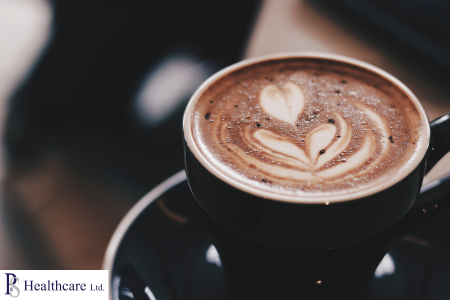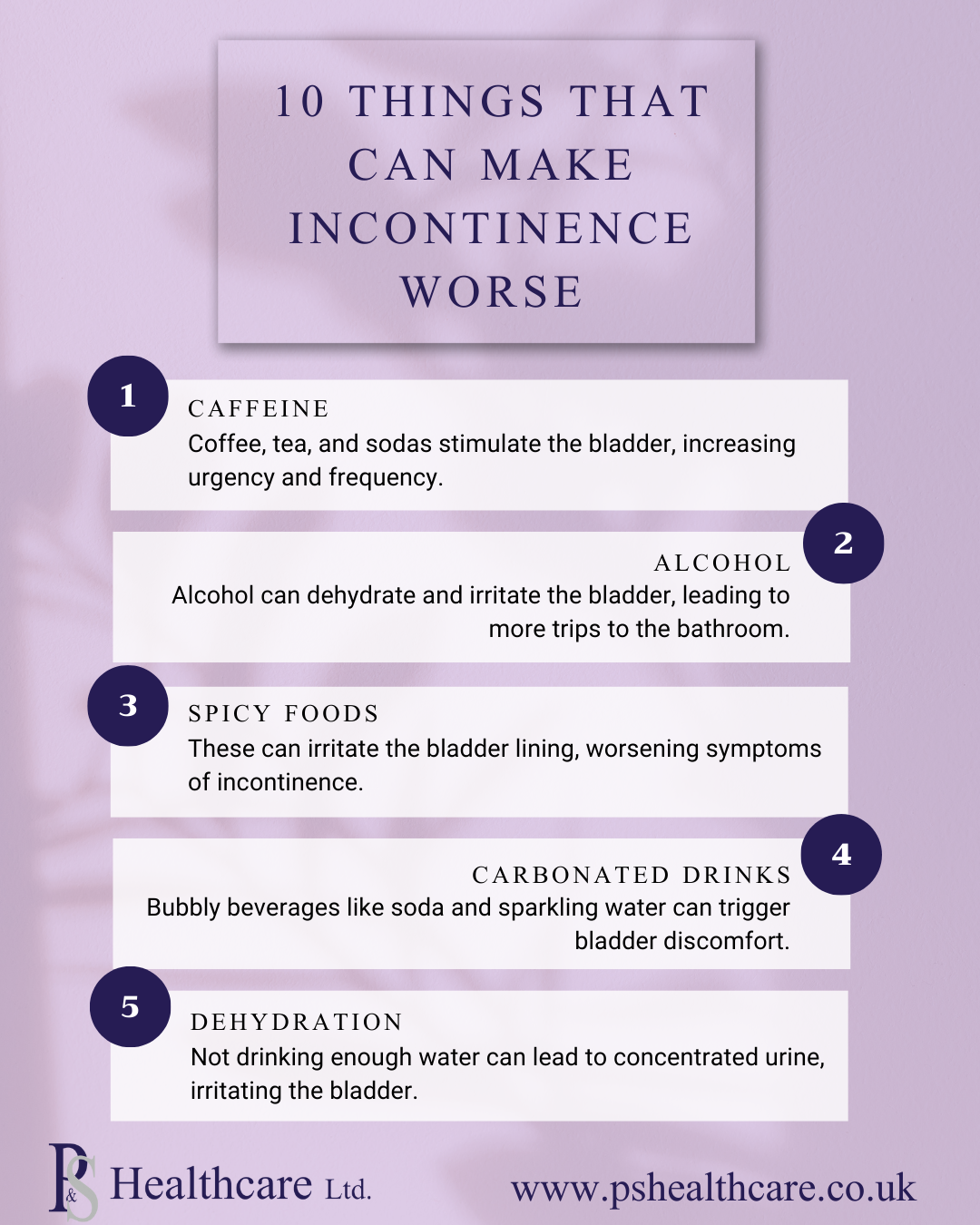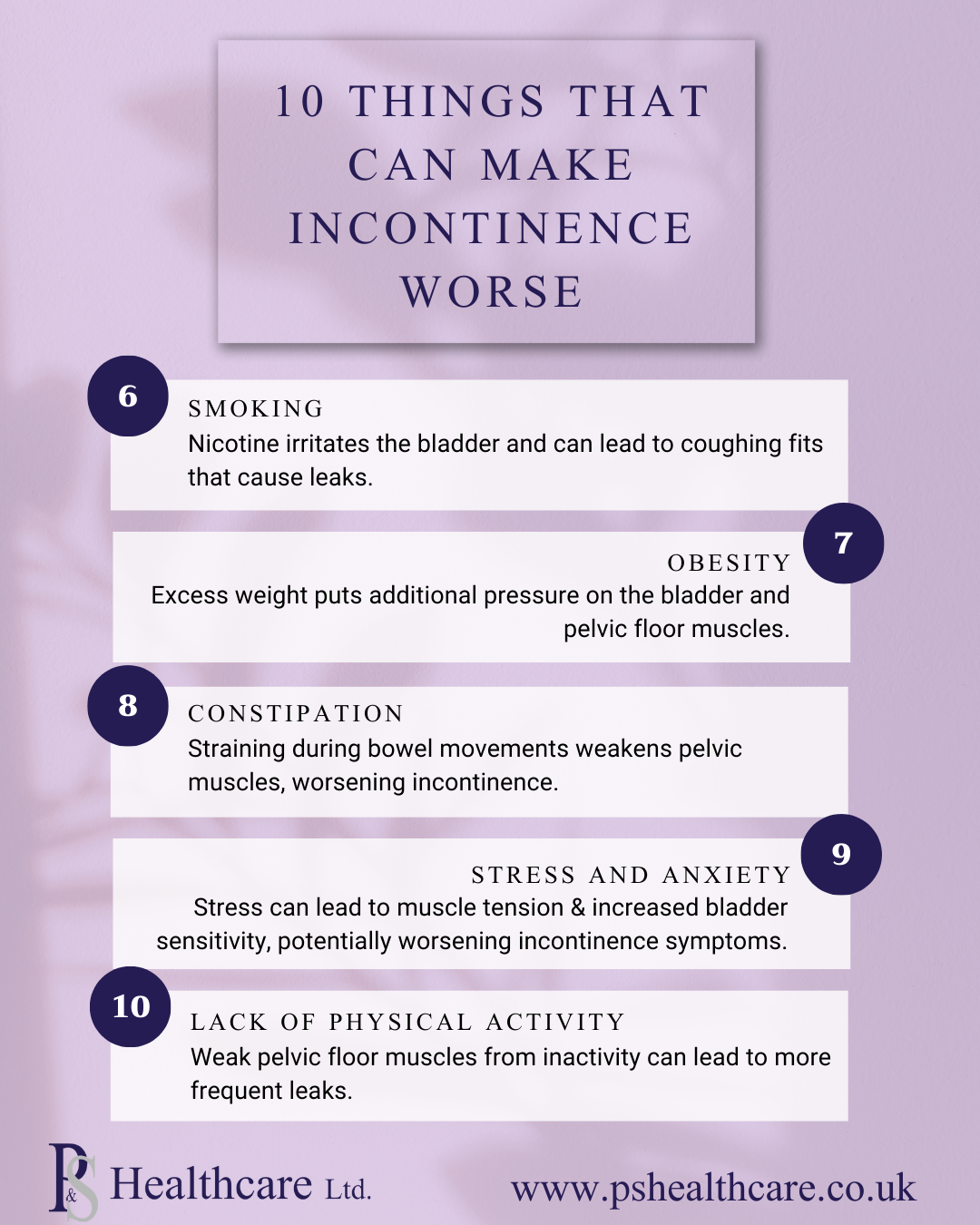10 Things That Can Make Incontinence Worse

Living with incontinence can be challenging, but understanding and managing the factors that worsen symptoms can significantly improve quality of life. Many common lifestyle choices, habits, and even foods can exacerbate incontinence, leading to increased urgency, frequency, and discomfort. Here are ten things that can make incontinence worse, along with tips on how to manage or avoid these triggers.
1. Caffeine
Caffeine in coffee, tea, sodas, and energy drinks acts as a diuretic, stimulating the bladder and increasing both urgency and frequency. For those with incontinence, limiting caffeine intake can reduce episodes and promote bladder control. Try gradually switching to caffeine-free alternatives or limiting consumption to one cup in the morning.
2. Alcohol
Alcohol is another bladder irritant that can lead to dehydration, making symptoms of incontinence worse. As alcohol leaves the body, it irritates the bladder and causes more frequent trips to the bathroom. Reducing alcohol intake, especially during social events or before bed, can lessen the risk of incontinence flare-ups.
3. Spicy Foods
While spicy foods add flavour to meals, they can also irritate the bladder lining, triggering symptoms of incontinence. Ingredients like chili peppers and hot spices may worsen bladder control, especially when eaten frequently. Opt for milder seasonings or limit spicy foods if you notice worsening symptoms after consuming them.
4. Carbonated Drinks
Carbonated drinks, such as soda and sparkling water, contain bubbles that can create bladder discomfort and increase urgency. These drinks are also often high in caffeine and sugar, adding to their impact on bladder health. Choosing non-carbonated beverages can help reduce discomfort and ease symptoms.
5. Dehydration
While it might seem counterintuitive, not drinking enough water can make incontinence worse. Dehydration leads to concentrated urine, which irritates the bladder and increases urgency. Staying hydrated by drinking small sips throughout the day can keep urine diluted and prevent irritation without overwhelming the bladder.
6. Smoking
Smoking has a double impact on incontinence. Nicotine irritates the bladder, and smoking-related coughing fits can put extra pressure on the pelvic floor muscles, increasing leakage. Quitting smoking not only reduces incontinence but also benefits overall health.
7. Obesity
Carrying excess weight places additional pressure on the bladder and the pelvic floor muscles, which can worsen incontinence. Maintaining a healthy weight through a balanced diet and regular exercise can alleviate some of this pressure, helping to improve bladder control.
8. Constipation
Straining during bowel movements weakens the pelvic muscles over time, which can worsen incontinence. To avoid constipation, incorporate fibre-rich foods into your diet, drink plenty of water, and engage in regular physical activity. Addressing constipation can relieve pressure on the pelvic area and improve bladder function.
9. Stress and Anxiety
High levels of stress and anxiety can contribute to muscle tension, which affects the bladder and may worsen incontinence symptoms. Practicing relaxation techniques, such as deep breathing exercises or mindfulness, can help reduce stress and alleviate some of the pressure on the bladder.
10. Lack of Physical Activity
A sedentary lifestyle can lead to weakened pelvic floor muscles, which play a crucial role in bladder control. Regular exercise, especially activities that strengthen the core and pelvic floor, can help improve muscle tone and reduce leaks. Simple exercises like Kegels can be highly effective in promoting bladder control over time.
While these factors can worsen incontinence, understanding and managing them can make a significant difference. By adjusting lifestyle choices, dietary habits, and physical activity, it’s possible to minimise triggers and take steps toward better bladder health. Small changes can lead to greater comfort, confidence, and control. For further guidance on managing incontinence, speak with a healthcare professional.
Don't forget to download our handy infographic...


More News:
- Choosing the Right Children's Nighttime Pants and Daytime Solutions
- How to Choose the Right Incontinence Supplies for Men Over 50
- Christmas Confidence
- Real Women, Real Stories: Living Confidently with Washable Incontinence Pants
- A Real-Life Guide to Incontinence Bed Sheets & Washable Bed Pads
- The Environmental Benefits of Reusable Bedwetting Pants for Kids
- Men's Washable Incontinence Pants for Everyday Confidence: A User's Guide
- Top Features to Look for in Washable Incontinence Pants for Women
- 5 Mistakes to Avoid When Washing Your Reusable Incontinence Bed Pads
- The Best Bedwetting Pants for Children: What Parents Need to Know
- Male Washable Incontinence Pants vs. Disposable: Which Is Better?
- The Best Incontinence Pants for Women
- The Complete Guide to Washable Bed Pads & Incontinence Products
- How to Talk to Your Child About Incontinence: Supportive Parenting Strategies
- Incontinence Supplies for Men: What You Actually Need
- Washable Incontinence Pants for Women: A Comfortable, Eco-Friendly Solution
- Children's Incontinence Pants: How They Help Kids Stay Dry and Confident
- Why More Men Are Switching to Washable Incontinence Pads and Pants
- Managing Incontinence as a Woman: Tips for Travel, Work, and Home Life
- The Best Washable Incontinence Pants in the UK
- Real Stories from Families Using Children's Nighttime Pants
- Caring for a Loved One? A Carer's Guide to Incontinence Supplies for Men
- Why Ladies Washable Incontinence Pants Are Better for the Planet
- Understanding Why Older Children Still Wet the Bed and What You Can Do About It
- Travelling with Incontinence: Best Washable Incontinence Pants for Men on the Go
- Your Guide to Washable Incontinence Pants for Ladies: FAQs Answered
- The Benefits of Switching to Washable Incontinence Products
- 8 Everyday Activities That Can Strengthen or Weaken Your Bladder
- 10 Things You Should Pack in an Incontinence Emergency Kit
- 10 Foods to Eat and Avoid for Better Bowel Control
- 8 Ways Stress and Anxiety Can Affect Bladder Health
- 10 Signs It's Time to See a Doctor About Your Urinary Incontinence
- 10 Tips for Talking to Your Child About Bedwetting
- 10 Things You Should Know About Postpartum Incontinence
- 10 Common Triggers of Urinary Incontinence in Women Over 50
- 10 Tips for Night-Time Incontinence Management in Adults
- 10 Ways to Manage Incontinence While Playing Sports
- Your Incontinence Options: Finding the Right Solution for You
- 10 Tips for Managing Faecal Incontinence in Adults
- 10 Lifestyle Changes to Manage Urinary Incontinence Symptoms
- 10 Ways to Manage Urinary Incontinence During Pregnancy
- 10 Causes of Urinary Incontinence in Men and How to Treat Them
- 10 Practical Solutions for Coping with Incontinence at Work
- 10 Myths About Menopause and Incontinence You Should Stop Believing
- 10 Foods to Avoid to Prevent Bladder Irritation and Incontinence
- 10 Effective Pelvic Floor Exercises for Urinary Incontinence
- 10 Common Causes of Bedwetting in Children and How to Address Them
- Causes of Faecal Incontinence
- Breaking the Silence: Managing Incontinence with Confidence
- Supporting Loved Ones with Incontinence: A Caregiver's Guide
- Top 10 Tips for Managing Incontinence Comfortably This Christmas
- Pregnancy and Postpartum Incontinence: Prevention and Recovery
- 10 Random Facts About Pee You Probably Didn't Know
- Diet and Bladder Health: Foods That Help and Hurt
- Helping Your Child Manage Incontinence: A Parent's Resource
- The Most Common Bladder Control Problems and How to Manage Them
- 10 Things That Can Make Incontinence Worse
- Incontinence Myths vs Facts - Dispelling Common Misconceptions
- Top 10 tips to help with bladder control during pregnancy
- 10 Effective Ways to Stop Bladder Leaks & Manage Incontinence
- P&S Washable Face Mask with ViralOff
- New Product For Men - The Slip Brief
- New Monthly Protection Briefs For Women
- New Product - The OooPS Pant for Stress Incontinence
- New Adult Inco-elite Range Launched
- EMDA WOMEN OF WORTH AWARD 2009
- New Website Launched
- New Website Under Development

